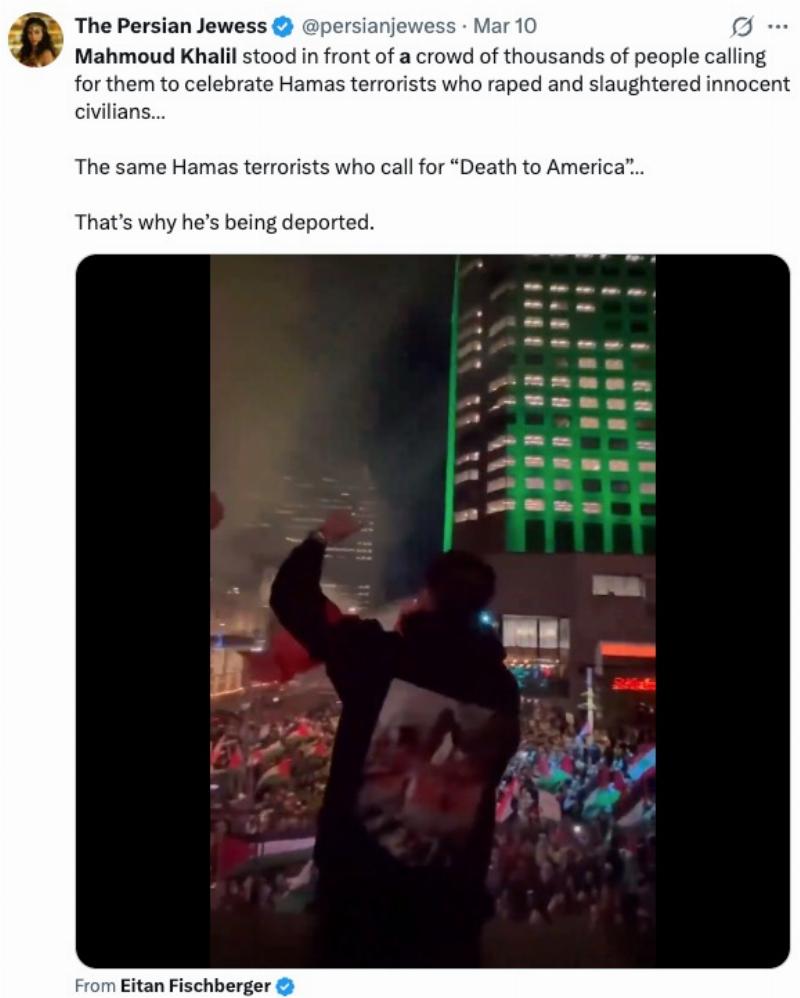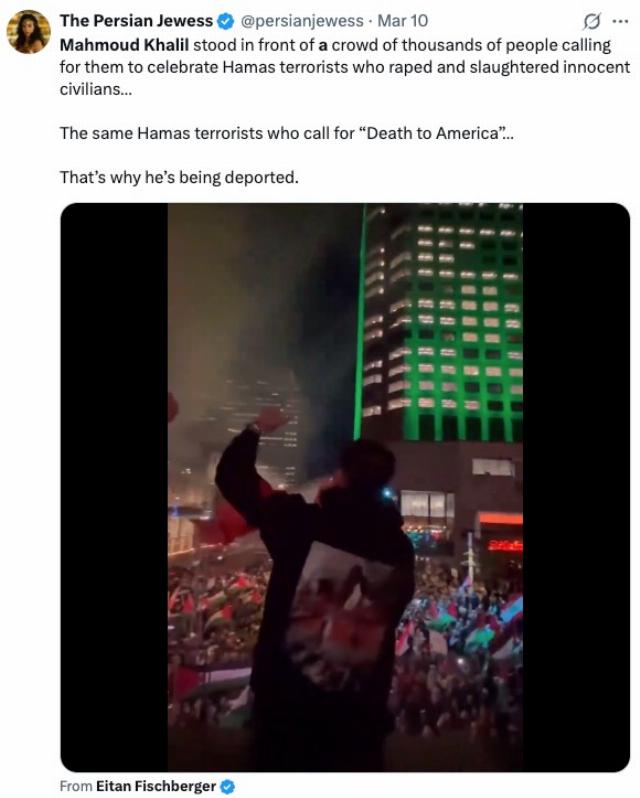


I got a call yesterday asking me if I’d do an interview with the BBC’s Rebecca Kesby, a host on the BBC World News program, about the Mahmoud Khalil issue. He’s the Syrian-born green-card holder whom Trump is working to deport. I don’t respect the BBC (and why should I?) but I subscribe to the Scott Adams school of doing interviews: They’re not going to change my mind, but perhaps I can change a few of their listeners’ minds. So, I said “yes.” It was an interesting experience, and I’m curious to see how they reduce the pre-recorded interview from approximately 20 minutes down to 6.
Going in, I was told that this was supposed to be an open-minded inquiry into the situation on campuses generally—sort of the thing that Christopher Rufo might know—rather than the details of Khalil’s case. Because I like to be overprepared, I didn’t take that too seriously, and I read up on the Khalil case, so that I’d know as much as possible about anything Kesby asked me. I was wise to do so, because that was her focus.

Image: X screen grab.
Here’s what I learned, starting with free speech issues, and then moving to Khalil himself:
Undisputed fact: Our First Amendment states “Congress shall make no law...abridging the freedom of speech...or the right of the people peaceably to assemble, and to petition the Government for a redress of grievances.”
Undisputed fact: We have never had absolute free speech. Instead, there is a long list of limitations on free speech, all of which revolve around speech tied directly to clearly criminal activity. We all know that fraud and defamation are actionable speech. Other actionable speech is threatening the president of the U.S., threatening anyone with harm, conspiring to commit certain types of crime, inducing imminent violence, etc. The First Amendment is about the exchange of ideas, not incitement to crime.
Undisputed fact: While students do not give up their free speech rights, they have no greater rights than other citizens. In other words, they are constrained by the same limitations described in the preceding paragraph.
Undisputed fact: Khalil is a Syrian-born man who came to the U.S. on a student visa but, after marrying an American citizen, became a legal resident (i.e., a “green card holder”).
Undisputed fact: After October 7, 2023, media sympathetic to Khalil’s position have consistently assert that he represented Columbia University Apartheid Divest (“CUAD”) in dealings with Columbia University. In other words, he was CUAD’s spokesman.
Undisputed law: 8 US.C. 1182 (“inadmissible aliens”) holds that a person is inadmissible in America if he engages in terrorist activities.
What’s relevant here is that a person has committed a terrorist activity if he is “a representative...of...a political, social, or other group that endorses or espouses terrorist activity.” A “representative” includes a “spokesman of an organization, and any person who directs, counsels, commands or induces an organization or its members to engage in terrorist activity.”
That organization doesn’t have to be on the designated U.S. terrorist list (which Hamas happens to be). Instead, a terrorist organization exists whenever there is “a group of two or more individuals, whether organized or not, which engages in, or has a subgroup which engages in” certain defined activities. These activities include, in relevant part, inciting people to cause death or serious bodily injury, soliciting funds for such activities, encouraging membership in an organization that wants to commit or incite terrorist activities, etc.
However, one doesn’t have to go down the path of representatives and organizations. An immigrant or wannabe has also committed impermissible terrorist activities if he “endorses or espouses terrorist activity or persuades others to endorse or espouse terrorist activity or support a terrorist organization...”
And of course, as Marco Rubio noted, the same statute says that the Secretary of State has the authority to bar the entry of anyone he “has reasonable ground to believe would have potentially serious adverse foreign policy consequences for the United States is inadmissible.”
If you cannot be admitted to the U.S. for these reasons, you also cannot stay in the U.S. for the same reasons.
Undisputed fact: The organization that the media have stated that Khalil openly represented—CUAD—has a long history of making public pronouncements via social media about its support for overthrowing the United States government via violent action. You can read the details that Ryan Mauro assembled or follow this thread.
Assumption: Given CUAD’s openly stated ideology, it’s difficult to believe that Khalil was unaware of it.
Undisputed fact: Through his lawyers, Khalil has denied any direct links to Hamas, and vigorously asserts that he was merely exercising his right to free speech rather than engaging in criminal terrorist activity of the type that justifies deportation (and that, if proven, should also see American citizens imprisoned).
In sum, Khalil allegedly exceeded the boundaries of legal free speech by acting as a representative for an organization that openly espouses the violent overthrow of the United States government, conduct that if proven fully justifies deportation. That’s my conclusion, and I’m sticking to it.
And about that BBC interview. I know I’ll probably be sliced and diced beyond recognition because Kesby had a narrative (and I probably misspoke or didn’t speak clearly at times, especially because Kesby relentlessly cut me off). Her narrative is that
Kesby did not want to hear that
At the end of the conversation, I surprised Kesby (I think) by thanking her wholeheartedly for helping me consolidate my thoughts via her questions. I’m now more certain than before that Khalil has an uphill struggle based on the available facts and laws (and that one assumption) to maintain his green-card status.
